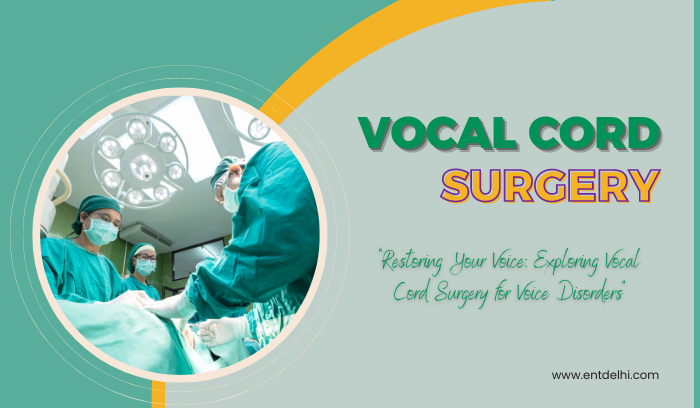Vocal Cord Surgery
Vocal cord surgery is a medical procedure aimed at addressing issues related to the vocal cords, which play a crucial role in producing voice. The vocal cords, also known as vocal folds, are located in the larynx (voice box) and vibrate when air passes through them, producing sound. When problems occur with the vocal cords, it can affect voice quality, pitch, volume, and overall vocal function. Vocal cord surgery can help individuals find their voice again by addressing various conditions that may affect their vocal cords.
Who May Be a Candidate for Vocal Cord Surgery? There are several conditions that may make someone a candidate for vocal cord surgery. These may include:
- Benign lesions on the vocal cords: Conditions such as vocal cord nodules, polyps, cysts, hemorrhages, or papillomas can develop on the vocal cords, affecting their ability to vibrate properly and produce clear voice. If conservative treatments such as voice therapy or medication do not provide sufficient relief, vocal cord surgery may be recommended. Some malignant lesions are also operated upon.
- Vocal cord paralysis or weakness: Vocal cord paralysis or weakness can result from nerve damage or other underlying conditions, leading to voice changes, breathing difficulties, and swallowing problems. Vocal cord surgery, such as thyroplasty or laryngeal framework surgery, may be considered to reposition the affected vocal cord and restore normal vocal function.
- Spasmodic dysphonia: Spasmodic dysphonia is a neurological condition that causes involuntary spasms in the vocal cords, leading to voice disruptions. If conservative treatments do not effectively manage the symptoms, cordotomy, a type of vocal cord surgery, may be considered to selectively cut some of the nerves controlling the vocal cords and improve voice quality.
When is Vocal Cord Surgery Needed? Vocal cord surgery may be needed when conservative treatments do not effectively manage vocal cord conditions or when the condition is severe and affecting the quality of life. It is typically considered after thorough evaluation and diagnosis by a qualified healthcare professional, such as an otolaryngologist or a laryngologist, who will assess the individual’s vocal cord condition, medical history, and overall health to determine the most appropriate treatment approach.
Precautions after Vocal Cord Surgery It is important to follow the post-operative instructions provided by the healthcare professional to ensure proper healing and recovery. Some common precautions may include:
- Voice rest: Resting the voice and avoiding excessive talking, coughing, or throat clearing for a period of time as advised by the healthcare professional.
- Avoiding irritants: Avoiding irritants such as smoking, alcohol, and excessive use of caffeine or spicy foods that may irritate the vocal cords and delay healing.
- Hydration: Maintaining proper hydration by drinking plenty of water and avoiding excessive throat clearing or coughing, which can further strain the vocal cords.
- Voice therapy: Following a recommended voice therapy program to help restore vocal function, improve vocal technique, and prevent vocal cord strain.
- Follow-up appointments: Attending follow-up appointments with the healthcare professional to monitor the healing process and address any concerns or complications that may arise.
It’s important to note that recovery time and outcomes may vary depending on the type of vocal cord surgery, the specific condition being treated, and individual factors. It’s crucial to closely follow the healthcare professional’s instructions and seek their guidance throughout the recovery process.
In conclusion, vocal cord surgery is a medical procedure that can help individuals find their voice again by addressing various conditions affecting the vocal cords. It may be recommended for benign lesions, vocal cord paralysis or weakness, or spasmodic dysphonia when conservative treatments are not effective. Following proper precautions and post-operative care, as advised by the healthcare professional, is crucial to ensure successful recovery and optimal vocal function

